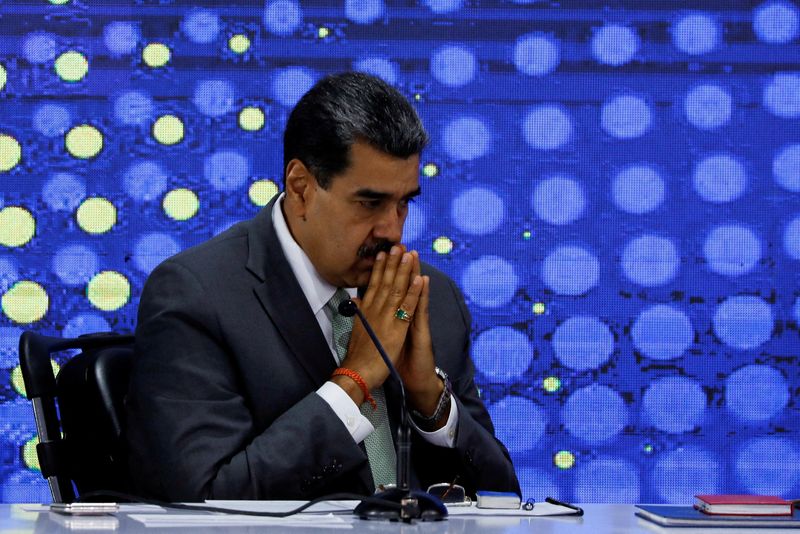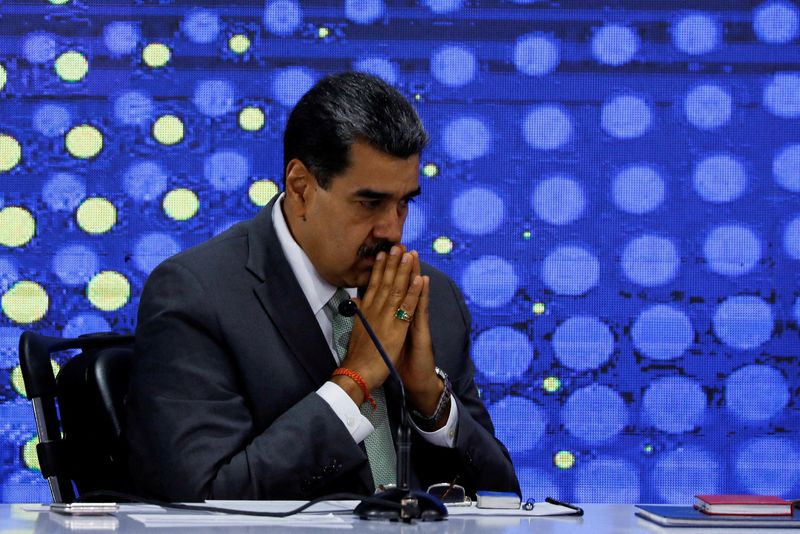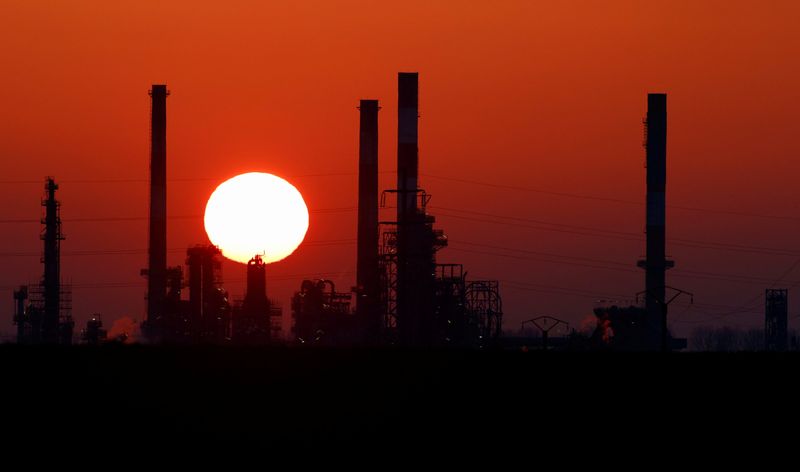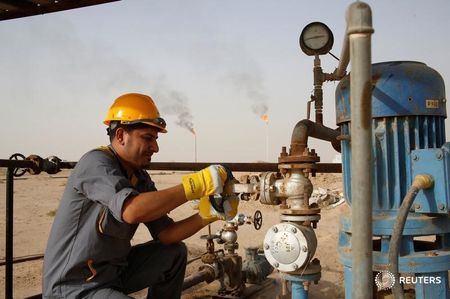Commodities
US signals Venezuela oil sanctions relief at risk as deadline looms

By Matt Spetalnick, Daphne Psaledakis and Marianna Parraga
WASHINGTON/HOUSTON (Reuters) – The Biden administration has signaled that it could reimpose oil sanctions on Venezuela on Thursday in response to what U.S. officials see as President Nicolas Maduro’s failure to meet his commitments for free and fair elections this year.
Barring any last-minute concessions by Maduro, the U.S. has made clear it is not likely to renew a six-month license that granted the OPEC member partial sanctions relief from October, following an election deal reached between the government and the Venezuelan opposition. It expires just after midnight EST (0400 GMT Thursday).
Washington had repeatedly threatened in recent months to reinstate punitive measures on Venezuela’s vital oil and gas sector unless Maduro made good on his promises, including allowing the opposition to run the candidate of its choice against him in the July 28 election.
Maduro’s government has complied with some of the terms of the deal, signed in Barbados.
The withdrawal of the most significant element of U.S. sanctions relief would mark a major step back from U.S. President Joe Biden’s policy of re-engagement with the Maduro government.
But the Biden administration is expected to stop short of a full return to the “maximum pressure” campaign waged under former U.S. President Donald Trump, according to people familiar with the matter.
Weighing on the U.S. decision have been concerns about whether reimposing sanctions on Venezuela’s energy sector could spur higher global oil prices and increase the flow of Venezuelan migrants to the U.S.-Mexico border as Biden campaigns for reelection in November.
“We have made very clear that if Maduro and his representatives did not fully implement their agreements under the Barbados agreement, we would reimpose sanctions, and I would just say stay tuned,” U.S. State Department spokesperson Matthew Miller told a daily briefing in Washington on Tuesday. He declined to elaborate.
Maduro’s government has repeatedly reacted with defiance the Washington’s warnings.
“International companies continue coming to Venezuela,” Venezuelan Oil Minister Pedro Tellechea said in Caracas. “With or without sanctions, Venezuela will be respected.”
Venezuela’s oil exports in March rose to their highest level since early 2020 as customers rushed to complete purchases ahead of the possible return of sanctions, Reuters reported this month.
DELIBERATIONS ON SANCTIONS OPTIONS
Deliberating on how far to go, Biden’s aides had discussed a range of options ahead of the expiration of the U.S. Treasury license that has allowed Venezuela to freely sell its crude, U.S. sources said. Among the steps they considered was allowing Venezuela to continue shipping oil but reimposing a ban on the use of U.S. dollars in such transactions.
Failure to renew the current license would not rule out the possibility that the U.S. could at some point issue a new version to replace it if Maduro starts to give ground on electoral commitments.
Without a general license, however, most foreign partners of Venezuela’s state-run oil firm PDVSA may have no other option but to increase pressure for individual U.S. authorizations, which they have been seeking for years.
A group of Republican U.S. senators sent a letter to Biden urging his administration not to renew the license, saying “we must not cede American leverage by lifting U.S. sanctions while the Maduro government deliberately disregards its obligations.”
The Biden administration initially re-engaged diplomatically with Maduro when the U.S. was looking for ways to get more oil on world markets to offset the rise in crude prices from Western sanctions imposed on Russia over its 2022 invasion of Ukraine. Those contacts led to a deal for easing some of the harsh Trump-era sanctions on Caracas.
Miller acknowledged to reporters that Maduro has “upheld certain aspects” of the Barbados agreement, including setting an election timetable and inviting international observers.
But Venezuelan election authorities have maintained an election ban on Maria Corina Machado, who resoundingly won the opposition primary last October, and the opposition is currently holding internal negotiations about who could run as a substitute.

Maduro’s 2018 re-election was rejected by the U.S. and other Western governments as a sham.
The U.S. has also decried a string of arrests in recent months of opposition politicians and activists.
Commodities
Oil edges higher as investors eye Mideast talks, rates meeting

By Noah Browning and Deep Kaushik Vakil
LONDON (Reuters) – Oil edged up on Tuesday a day after falling as Israel-Hamas talks offered hopes of a ceasefire even as Red Sea attacks continued, while investors awaited signals on U.S. interest rates ahead of a meeting on Wednesday.
futures for June, which expire on Tuesday, were up 26 cents, or 0.3%, to $88.67 a barrel at 1101 GMT. The more active July contract rose 38 cents, or 0.4%, to $87.58 per barrel.
U.S. West Texas Intermediate crude futures were up 34 cents, or 0.4%, to $82.97 a barrel. The front-month contract of both benchmarks lost more than 1% on Monday.
“New hopes of a ceasefire between Israel and Hamas caused oil prices to fall at the start of the week,” said Commerzbank (ETR:) analyst Carsten Fritsch, adding that prices were also pressured by lower crude demand from refineries leading to higher inventory levels.
Hamas negotiators left Cairo late on Monday to consult with the group’s leadership after talks with Qatari and Egyptian mediators on a response to a phased truce proposal that Israel presented over the weekend.
The delegation was expected to report back within two days, two Egyptian security sources said.
Continued attacks by Yemen’s Houthis on maritime traffic south of the Suez Canal – an important trading route – have provided a floor for oil prices and could prompt higher risk premiums if players anticipate crude supply disruptions.
“The upcoming Fed meeting also drives some near-term reservations,” said Yeap Jun Rong, market strategist at IG. “Rates being kept at elevated levels for longer could trigger a further rise in the U.S. dollar, while also putting some risks to oil demand outlook.”
remove ads
.
Investors are on watch this week for the U.S. Federal Reserve’s May 1 policy review, with stubborn inflation pushing out market expectations for any rate cuts, which could bolster the U.S. dollar and hamper oil demand.
Some investors are cautiously pricing a higher probability that the Fed could hike interest rates by a quarter percentage point this year and next as inflation and the labour market remain resilient.
Additionally, concerns over demand have weighed on sentiment, ANZ analysts said in a research note, as premiums for diesel and over have fallen to their lowest in months.
Commodities
Oil prices rise; Israel/Hamas peace talks, Fed meeting in focus

Investing.com– Oil prices edged higher Tuesday, rebounding after the prior session’s declines with the focus remaining on the ceasefire talks between Israel and Hamas and the latest Federal Reserve meeting.
At 08:50 ET (12:50 GMT), rose 0.6% to $87.71 a barrel, while gained 0.7% to $83.23 a barrel.
Israel-Hamas ceasefire talks in focus
Both benchmarks had fallen around 1% on Monday after delegates from Israel and the militant group Hamas met in Cairo for peace talks.
Media reports said that Israel had offered a 40-day ceasefire offer to Hamas in exchange for the return of hostages and displaced families begin allowed back into northern Gaza. It also includes new wording intended to satisfy Hamas’ need for a permanent ceasefire.
The Hamas delegation left Cairo, and will return with a written response to the proposal, reports said.
Peace talks between Israel and Hamas have repeatedly fallen through in recent months, with Hamas stating that it will not accept any proposal short of a permanent ceasefire.
But a ceasefire represents a potential de-escalation in the conflict, which could see traders attach an even lower risk premium to oil.
Fears of disruptions in Middle East supply have been a key booster of oil prices in recent weeks.
Fed meeting, interest rate policy in focus
Oil prices have also been pressured by the prospect of higher-for-longer U.S. interest rates, ahead of a this week
The central bank is widely expected to keep rates steady. But any signals on future rate cuts will be watched, especially as traders have largely priced out the prospect of early rate cuts in 2024.
remove ads
.
Markets fear that higher-for-longer rates will pressure the global economy and in turn dent oil demand this year.
Strength in the also pressured oil prices.
The is scheduled to release its latest estimate of weekly crude inventories later in the session.
G7 agrees to end coal use in power generation
In other news, energy ministers from the Group of Seven major democracies agreed on Tuesday to end the use of coal in power generation “during the first half of (the) 2030s”, according to an official communique.
However, in a caveat, the statement included an alternative goal of phasing out coal-fired power plants “in a timeline consistent with keeping a limit of a 1.5°C temperature rise within reach, in line with countries’ net-zero pathways”.
(Ambar Warrick contributed to this article.)
Commodities
Oil prices slide on Middle East peace talks; Fed decision awaited

Investing.com–Oil prices drifted lower Monday as peace talks between Israel and militant group Hamas in Cairo tempered fears of a wider conflict in the Middle East disrupting supplies, but losses were limited by caution ahead of the latest Federal Reserve meeting.
At 08:25 ET (12:25 GMT), fell 0.6% to $87.69 a barrel, while fell 0.7% to $83.25 a barrel.
Middle East peace talks
A Hamas delegation will visit Cairo on Monday for talks aimed at securing a ceasefire, a Hamas official told Reuters on Sunday, with the group expected to respond to Israel’s latest Gaza phased truce proposal delivered on Saturday.
Concerns that the conflict between Hamas and Israel would balloon into a wider war in the oil-rich region prompted sharp gains earlier this month, as traders worried that this could result in a big hit to supplies from the region.
US rate fears grow on sticky inflation, Fed anticipation
Markets further dialed back bets on early interest rate cuts by the Federal Reserve after data- the Fed’s preferred inflation gauge- read hotter than expected for March.
Fears of higher-for-longer U.S. interest rates factored into concerns that oil demand will weaken later this year, especially as economic growth weakens. This notion was furthered by weaker-than-expected U.S. growth data last week.
Strength in the , following the inflation data, also pressured crude prices.
The focus is now squarely on a meeting later this week, where the central bank is widely expected to keep rates steady and offer hawkish signals on monetary policy.
remove ads
.
Beyond the Fed, more economic cues were also in focus this week for oil markets. data from top importer China is due later in the week, and is expected to offer more insight into an ongoing economic recovery in the country.
Geopolitical tensions, tight supply bets persist
The specter of geopolitical tensions and potential supply risks in oil markets still remained in play.
Ukraine attacked more Russian oil refineries over the weekend, while also calling on more military aid from the U.S. over worsening conditions on the front lines.
Attacks on Russian refineries factored into bets on tighter supplies, especially as Russia announced more production and export cuts earlier this year.
(Ambar Warrick contributed to this article.)

 Forex2 years ago
Forex2 years agoForex Today: the dollar is gaining strength amid gloomy sentiment at the start of the Fed’s week

 Forex2 years ago
Forex2 years agoHow is the Australian dollar doing today?

 Forex1 year ago
Forex1 year agoUnbiased review of Pocket Option broker

 Forex2 years ago
Forex2 years agoDollar to pound sterling exchange rate today: Pound plummeted to its lowest since 1985

 Cryptocurrency2 years ago
Cryptocurrency2 years agoWhat happened in the crypto market – current events today

 World2 years ago
World2 years agoWhy are modern video games an art form?

 Stock Markets2 years ago
Stock Markets2 years agoMorgan Stanley: bear market rally to continue

 Economy2 years ago
Economy2 years agoCrude oil tankers double in price due to EU anti-Russian sanctions

































